Soldiers’ celebrations depended on circumstances, personal beliefs, and family or community traditions. David DeSimone notes in his article “Another Look at Christmas in the Eighteenth Century”:
[From the seventeenth century the] celebration of Christmas was outlawed in most of New England. Calvinist Puritans and Protestants abhorred the entire celebration and likened it to pagan rituals and Popish observances. In 1659, the General Court of Massachusetts forbade, under the fine of five shillings per offense, the observance “of any such day as Christmas or the like, either by forebearing of labour, feasting, or any such way.” The Assembly of Connecticut, in the same period, prohibited the reading of the Book of Common Prayer, the keeping of Christmas and saints days, the making of mince pies, the playing of cards, or performing on any musical instruments. These statutes remained in force until they were repealed early in the nineteenth century.[1]
It seems that in civil society by the late eighteenth century those laws were “More honour’d in the breach than the observance.”[2] The wartime soldiers’ world was one in which such bans were also often only honored in the breach, or, at the very least, subject to human or military needs.
Members of the Society of Friends (Quakers) ignored Christmas. Visiting Philadelphia in 1749, naturalist Peter Kalm wrote,
Christmas Day . . . The Quakers did not regard this day any more remarkable than other days. Stores were open, and anyone might sell or purchase what he wanted . . . There was no more baking of bread for the Christmas festival than for other days; and no Christmas porridge on Christmas Eve! One did not seem to know what it meant to wish anyone a merry Christmas[3]
Quaker Job Whitall (whose property would soon host the site of Fort Mercer and the battle there in 1777) proved the point; on Christmas day 1776 he recorded,
Clear & cool. Our brown cow calved. After Dinner [the noon day meal], I went down to father Whitalls In my Slay & got a half barrel of water sider. Brother John Whitall was here & rode down in the Slay with me. I got my Sider & come home In the eavin[ing].[4]
On subsequent Christmases (1777 to 1779) he spent the day similarly.
Peter Kalm also noted the change in one Pennsylvania dissenting sect, perhaps an echo of the churches in other colonies: “[at] first the Presbyterians did not care much for celebrating Christmas, but when they saw most of their members going to the English church on that day, they also started to have services.”[5]
As for those who celebrated the season DeSimone writes:
Anglicans, Roman Catholics, Lutherans, and Moravians celebrated the traditional Christmas season with both religious and secular observances. These celebrations in eighteenth- century America were observed by the aforementioned communities in cities such as New York and Philadelphia, in the Middle Atlantic colonies of New York, Pennsylvania, and Maryland, and in the South.[6]
On Christmas Day 1749, Kalm observed,
Nowhere was Christmas Day celebrated with more solemnity than in the Roman Church [perhaps the Anglican Church, too]. Three sermons were preached there, and that which contributed most to the splendor of the ceremony was the beautiful music heard to-day . . . Pews and altar were decorated with branches of mountain laurel, whose leaves are green in winter time and resemble the (cherry laurel).[7]
For Virginia Anglicans the season was seen as a time for solemn reflection, self-examination, and anticipation of Christ’s second coming. New Jerseyian Phillip Vickers Fithian saw another aspect in December 1773: “Nothing is now to be heard of in conversation, but the Balls, the Fox-hunts, the fine entertainments, and the good fellowship, which are to be exhibited at the approaching Christmas.”[8]
As for the armies of the Revolution, any holiday, religious or secular, meant a lot to soldiers no matter their duties. An important aspect of any celebration was the possibility of a special meal to fill their bellies and the opportunity for feeling some small connection with homes left behind. The soldiers’ holidays were a curious admixture of hunger and bounty, pain and cheer, nostalgia and comradeship, with a healthy dose of humor thrown in for good measure.
Continental Army
Christmas in Gen. George Washington’s army was apt to be noted in passing, but generally went uncelebrated. In December 1776 Virginia Sgt. Thomas McCarty was on the Pennsylvania side of the Delaware River, merely trying to stay warm. On December 24 he wrote, “Christmas Eve. There was some talk of marching, and I drew provisions for the troops.” The following day he noted, “Christmas, December 25 . . . our men marched off in order of battle to cross at Brown’s Ferry. Crossed about 2 o’clock and marched for Trentown.”[9]
Christmas 1777 was largely sedentary but conditions had not improved. Connecticut Surgeon’s Mate Jonathan Todd wrote to his father on December 25, 1777, “Can assure you that I never saw A Christmas when I had no other Covering than Tow Cloth before ‑ On the Day appointed for the Continental Thanksgiving [December 18] We drew 1/2 Gill of Rice pr. man which with Beef & Flower were the dainties of our Feast.” [10]
Lt. Samuel Armstrong, 8th Massachusetts Regiment, noted of Yuletide 1777,
Thursday 25th: Christmas Day. We was without provisions therefore I was sent out to procure some [for the company], but could not get Enough ‘till three or four in the afternoon, when I got [49 wt.] of Salt Beef & 110 wt. of fresh Beef and two hundred & a half of flower and as soon as I returned, I was call’d out to go upon Scout & did not return ‘till about 10 OC. in the Evening. This was my Christmas frolick.[11]
Surgeon Albigence Waldo was very busy that day.
December 25, Christmas.—We are still in Tents—when we ought to be in huts—the poor Sick, suffer much in Tents this cold Weather. But we now treat them differently from what they used to be at home, under the inspection of Old Women and Doct. Bolus Linctus [a large quantity of a thick, liquid medication; may also refer to a patent medicine]. We give them Mutton & Grogg and a Capital Medicine once in a While, to start the Disease from its foundation at once. We avoid Piddling Pills, Powders, Bolus’s Linctus’s Cordials and all such insignificant matters whose powers are Only render’d important by causing the Patient to vomit up his money instead of his disease. But very few of the sick Men Die. [Surgeons reported 2,898 men unfit for duty at the end of that month.][12]
And New Hampshire Lt. Col. Henry Dearborn told of two Christmases, one year apart, that passed with little notice:
[Camp, Valley Forge] 25th [December 1777] we have Not so mery a Crismus as I have seen—the weather warm & Rayny . . .
[Camp Putnam, Redding, Connecticut] 24th [December 1778] we had a snow Last night & very Sevear Cold to Day.—our men are well Cloath’d & well Hutted.—[25th] Christmas Day. the weather is so very Cold we take but very little notice of the Day[13]
There were a few instances when circumstances allowed a pleasant Christmas, at least for the officers. Lt. Erkuries Beatty’s regiment, the 4th Pennsylvania, was hutted at Jockey Hollow, in New Jersey, during the most severe winter of the eighteenth century. He wrote his brother at the end of an enjoyable evening:
Camp near Morristown Christmas Day Dec. 25th 79.
Dr. Brother . . . I am just down from Dinner about half Drunk, all dined upon good roast & boiled [beef], but in a Cold hut, however grog enough will keep out cold for which there is no Desiring, tomorrow we all dine at one with the Colonel, which will be another excellent dinner and I think you may call that fair living, but Ah! I am afraid it wont last many Days[14]
British Forces
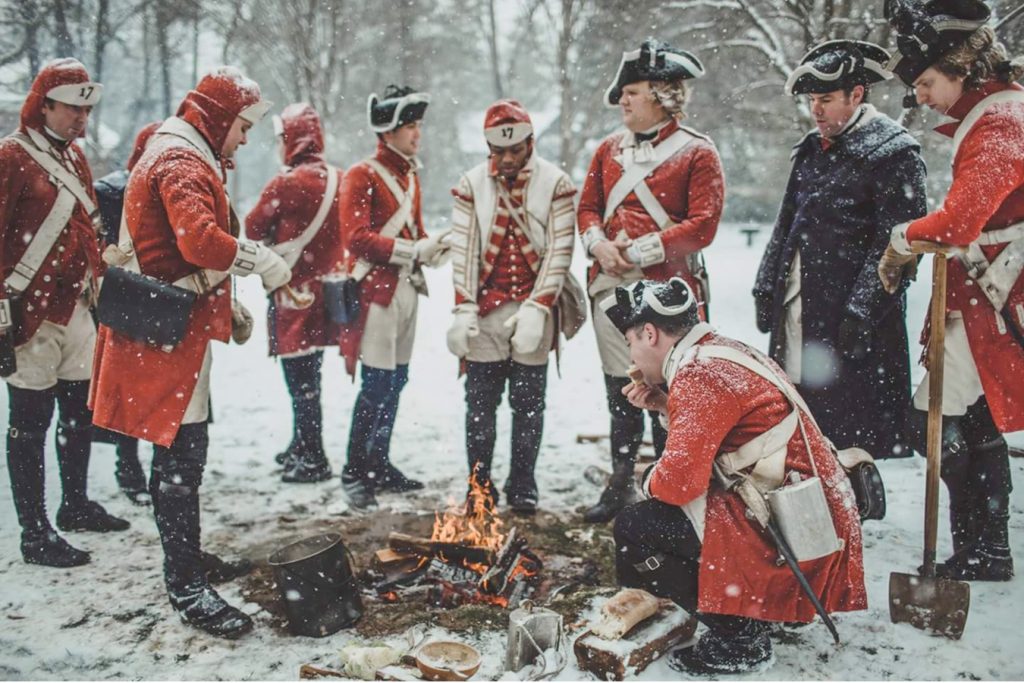
John Peebles, an officer in the 42nd Regiment, gave descriptions of four rather different Yuletides, the first in Newport, Rhode Island, 1776:
Wednesday 25th. Decr. XMass clear frosty weather . . . The Companys went to the Parade as usual when word came there was to be no General Parade today, sent home the comys—went to Church & hear’d a very good sermon inculcating peace among men—a very neat Church wt, a handsome organ the gift of Dr. Berkley Bishop of Cloyne [Ireland], a good many Inhabitants in church some decent looking People & the women tolerably well dress’d for Yanky’s—The Eveng. Cloudy, visited the Barracks as usual, pretty quiet considering it is christmass[15]
1777, Near Darby, Pennsylvania, covering forage parties gathering food and fodder for the Crown forces in Philadelphia:
Thursday 25th. Xmass. Very pleasant weather for the season . . . The waggons still busy carrying home forage—this morng. The Light Horse kill’d 3, wounded 2 & took 5 of the Rebels—some Battalions moved further down on the Chester road to cover the waggons below Darby Creek . . . Xmas not entirely forgot.[16]
In Jamaica, Long Island, New York, in 1778, Peebles’ regiment was quartered in rude huts; on November 23 he related that “the work at the Hutts at a stand for want of Nails & straw. all the wagons gone to the Eastward for boards to make doors, windows & Beds, which should have been provided before.” Of Christmas day he merely noted, “a great fall of Snow; had a Wild Goose for Xmas Dr.R[obison] dined here, port wine & punch.”[17]
December 1779, on board the ship Roebuck, lying off Sandy Hook, New Jersey, part of a force set to sail for Charleston, South Carolina, Peebles wrote:
Saturday 25th. Decr. Cold & cloudy . . . the large men of war without are getting underway as the w[eathe]r. does not admit of their riding there . . . Xmas celebrated with mirth & moderation, 16 Gentln in the Cabin, a dozen of wine every day & a clumsy dinner . . . a Regulation about the expenditure of water, having only 37 tons on board, & the dialy consumption has been 1 ½ tons, which is now lessened to one[18]
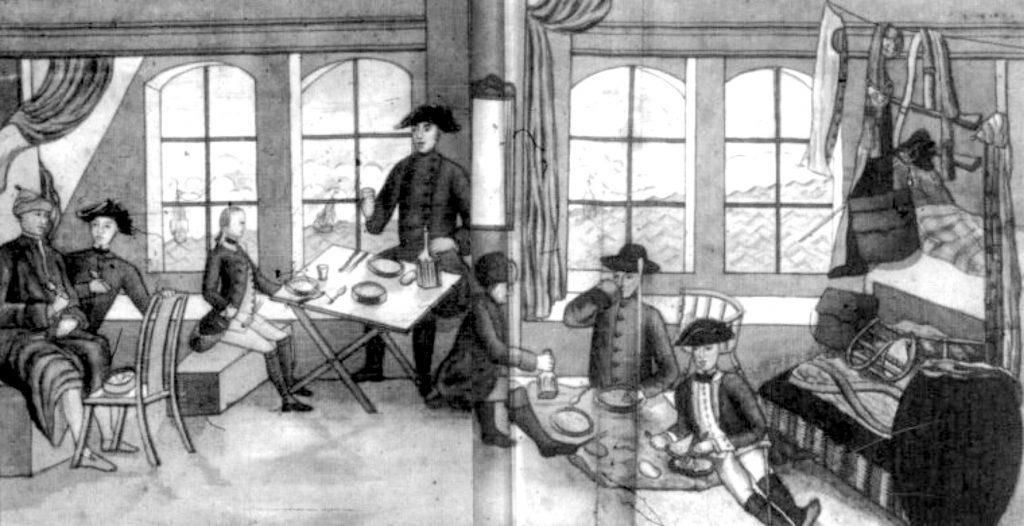
German Auxiliaries
John Charles Philip von Krafft arrived in Philadelphia early in 1778, and obtained a lieutenancy in the Hessian Regiment von Bose. At year’s end he was stationed on Upper Manhattan Island, near the Morris house. He wrote:
25 Dec. Frid[ay]. First Christmas holiday [spent in America]. I was detached, without bread, on active command on Nord River Hill. No bread could be procured, not even for money. I also had Company inspection and therefore wished to wake the men early that were under my command. When in the act of doing this, I had got to the Sergeant Major’s hut, I accidentally stepped upon an iron barrel-hoop, fell over a log of wood and cut my left shin on it. It made quite a wound and they advised me to give up the command and remain behind on account of the cold. But not wishing to do so I only put some rum and soap on it myself. To-day my leg swelled so much I had to take off my gaiters. On account of the lack of bread I sent an orderly over past the King’s Redoubt to the English bakery and there he bought me a loaf of white bread weighing a little over a German pound for 1 Engl. Shill. 5 ½ pence, and also some potatoes . . . So this was the good cheer of my Christmas holidays[19]
Third Waldeck Regiment Chaplain Philip Waldeck spent his career in various locales. In late 1776 his regiment was billeted at Elizabethtown, New Jersey. His December 16 journal entry reveals the circumstances of his end-of-year holiday:
The 16th . . . I preached in the large English church. Our officers were very gallant and escorted the ladies from their quarters to church. We brought the year to a close in fine quarters with many pleasures. The many inhabitants, who had fled from fear, now returned again because of the reports of good conduct of the regiment. We celebrated Christmas in peace and quiet. On both the first and second holiday, communion was served as there had been no time to do so during the autumn campaign, and many now took part. On the second holiday [the New Year] a very heavy snow fell.[20]
Two years later Waldeck was aboard ship, anchored at Greenwich, Jamaica. He wrote,
The 25th—Truly, I have never experienced such a hot Christmas Day . . . write this with open doors and windows and wearing only a shirt, which still makes me too warm. What a change—and how many reasons [for our “countryrmen”] to think kindly of us in the West Indies, to drink our health in Rhine wine and we drink theirs in Madeira and glasses full of punch . . . I will always remember this Christmas Day sealed deep in my soul.[21]
At the end of 1779 the 3rd Waldeck Regiment was stationed at Pensacola, Florida, with Chaplain Waldeck noting briefly
The 25th, Saturday—Once again it is Christmas. We held our religious services out-of-doors as usual, at nine o’clock. At noon I went with several other regimental officers to eat with the general.[22]
Lt. Carl Philipp von Feilitzsch of the Ansbach-Bayreuth Jaeger Corps, aboard ship enroute to Europe in 1779, wrote in his journal:
25 December . . . At twelve o’clock the storm began and by four o’clock it raged terribly. Our provisions and baggage, which had been protected and securely tied, tore loose. Even the doors caved in. No one was sure of his life in the cabin. During the night it was frightful. I would like to forget this Christmas Day.[23]
Only one account by a women with the army has been found, and a well-known lady she is. Frederika Charlotte Louise von Massow, Baroness (Freifrau) Riedesel zu Eisenbach atage sixteen married Col. Friedrich Adolf Riedesel Freiherr zu Eisenbach in 1762. In 1776 her husband was promoted to major general and sent to America. Following her husband in garrison and on campaign the Baroness (and her daughters) sailed to Canada, was with the army during the Saratoga campaign, went into captivity with the army, and traveled from Massachusetts to Virginia, back to New York, and finally to Canada. In her journal she mentioned Christmas 1781 at Sorel, Canada:
As [her husband] was unable to have a house built for us immediately, he bought one, the walls of which had only just been completed. He, however, gave orders that every thing should be in readiness for our reception on Christmas-eve . . . Our plan was given out and to our great astonishment we were able to eat our Christmas pie in our new house—with which dish the English always celebrate Christmas day[24]
French Troops
America’s French allies surely carried their traditions over, but no little evidence of them has been found. Baron Ludwig von Closen, aide–de–camp to French Lieutenant-Général Jean Baptiste Donatien de Vimeur, Comte de Rochambeau, wrote of local food preferences in Newport, Rhode Island: “At Christmas, you are invited to have minced-meat-tart (mince-pie)—as in England.”[25]In January 1782, while in Virginia, he revealed one holiday-related French secular tradition,
[10-15 January] On the 10th the frigate, Sybelle. . . arrived in York. We learned of the birth of a Dauphin [successor to the French throne]! . . . It is the custom in France, and especially in Paris, to compose some critical and bawdy songs every year, around Christmas time, concerning the ministers, ladies of the court, and other notable personages. This is one of the Christmascouplets, that one of my friends received confidentially, and that appeared in Paris at the time of the birth of the Dauphin:
Devil take the affair!
(Says the Comte d’Artois) [the King’s brother]
If I had wanted to do it
I could certainly have done so;
I would have been able to increase
This bastard race;
But for the good of my child
I went away, quite honestly
To love my Savoyarde! [26]
Conclusion
British Capt. John Peebles, once again at Jamaica, Long Island, ended 1781 in a situation that sounds in tune with a modern century Christmas.
Tuesday 25t h. Xmass The ground cover’d with snow as usual at this Season of mirth & festivity, & the sleighs flying about. Our Mess being engaged to dine with the Mess over the way, we met at the usual hour vizt. 4 o’clock sat down to a good dinner and took hearty drink, which is to be repeated at our Mess on New Years day. with some intermediate drinks with other people, in this manner we live & go on, trying to procure pleasure at the expense of the constitution[27]
American Lt. Col. Josiah Harmar, 6th Pennsylvania Regiment, left a seasonal wish. Quartered between Morristown, New Jersey, and the Pennsylvania camp at Jockey Hollow, Harmar wrote,
December 24th:
Fine Weather—Sleighing in Company with Doctor McDowell up to Mr. Hoel’s, my old sick Quarters, near Rockaway Bridge
December 25th:
Fine day—Left Mr. Hoel’s, and din’d with the Auditors near Morris Town–Merry Christmas[28]
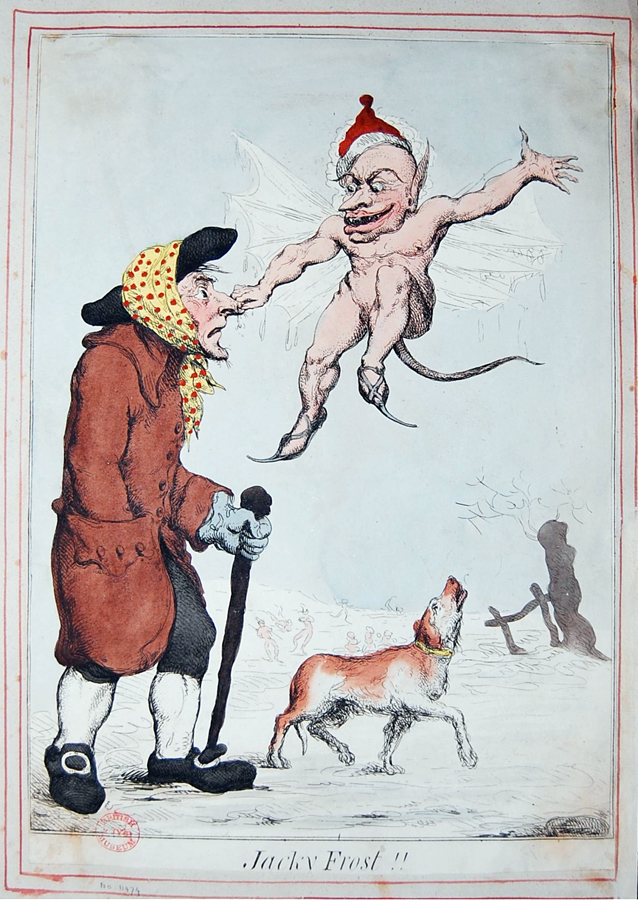
[1]David DeSimone, “Another Look at Christmas in the Eighteenth Century,” The Colonial Williamsburg Interpreter, vol. 16, no. 4 (Winter 1995-96), www.slaveryandremembrance.org/almanack/life/christmas/hist_anotherlook.cfm.
[2]William Shakespeare, Hamlet, Act 1, Scene 4.
[3]DeSimone, “Another Look at Christmas in the Eighteenth Century.”
[4]Florence DeHuff Friel, ed., The Diary of Job Whitall, Gloucester County, New Jersey (1775-1779) (Woodbury, NJ: Gloucester County Historical Society, 1992), 14, 71, 133, 157.
[5]DeSimone, “Another Look at Christmas in the Eighteenth Century.”
[8]Ibid. December 18, 1773 journal entry, John Rogers Williams, Philip Vickers Fithian, journal and letters, 1767–1774, student at Princeton college, 1770–72, tutor at Nomini Hall in Virginia, 1773–74 (Princeton, NJ: The University Library, 1900).
[9]Jared C. Lobdell, ed., “The Revolutionary War Journal of Sergeant Thomas McCarty, Proceedings of the New Jersey Historical Society (January 1961), 40.
[10]Jonathan Todd, letters 1777-78, 7th Connecticut Regiment, Revolutionary War Pension and Bounty – Land – Warrant Application Files, National Archives Microfilm Publication M804, reel 2395.
[11]Joseph Lee Boyle, “From Saratoga to Valley Forge: The Diary of Lt. Samuel Armstrong,” The Pennsylvania Magazine of History and Biography, CXXI, 3 (July 1997), 259-260.
[12]“Diary of Surgeon Albigence Waldo, of the Connecticut Line,” Pennsylvania Magazine of History and Biography, vol. XXI, no. 3 (1897), 312.
[13]Lloyd A. Brown and Howard H. Peckham, eds., Revolutionary War Journals of Henry Dearborn, 1775-1783 (Bowie, MD: Heritage Books, Inc., 1994), 119, 142-143.
[14]Joseph M. Beatty, “Letters of the Four Beatty Brothers of the Continental Army, 1774–1794,” Pennsylvania Magazine of History and Biography, vol. XLIV, no. 3 (1920), 207- 208.
[15]Ira D. Gruber, John Peebles’ American War: The Diary of a Scottish Grenadier, 1776-1782 (Mechanicsburg, PA: Stackpole Books, 1998), 74.
[19]Thomas H. Edsall, ed., Journal of John Charles Philip von Krafft, Lieutenant in the Hessian Regiment von Bose, 1776-1784 (New York: New-York Historical Society, 1888), 75.
[20]Bruce E. Burgoyne, ed., Eighteenth Century America: A Hessian Report on the People, the Land, the War, as Noted in the Diary of Chaplain Philip Waldeck (1776-1780) (Bowie, MD: Heritage Books, Inc., 1995), 28.
[23]Bruce Burgoyne, ed., Enemy Views: The American Revolutionary War as Recorded by the Hessian Participants (Bowie, MD: Heritage Books, Inc., 1996), xvii and 349.
[24]Friederike Charlotte Riedesel, Letters and Journals Relating to the War of the American Revolution and the Capture of the German Troops at Saratoga, William L. Stone, trans. (Kessinger Publishing reprint (n.d.) of 1867 edition), 194-195.
[25]Evelyn M. Acomb, (ed.), The Revolutionary Journal of Baron Ludwig von Closen, 1780–1783 (Chapel Hill: University of North Carolina Press, 1958), 49-50.
[27]Gruber, John Peebles’ American War, 501.
[28]“Lieut. Colonel Josiah Harmar’s Journal. No: 1. Commencing November 11th: 1778,” Josiah Harmar Papers, William C. Clements Library, Ann Arbor, Michigan, 79-80.





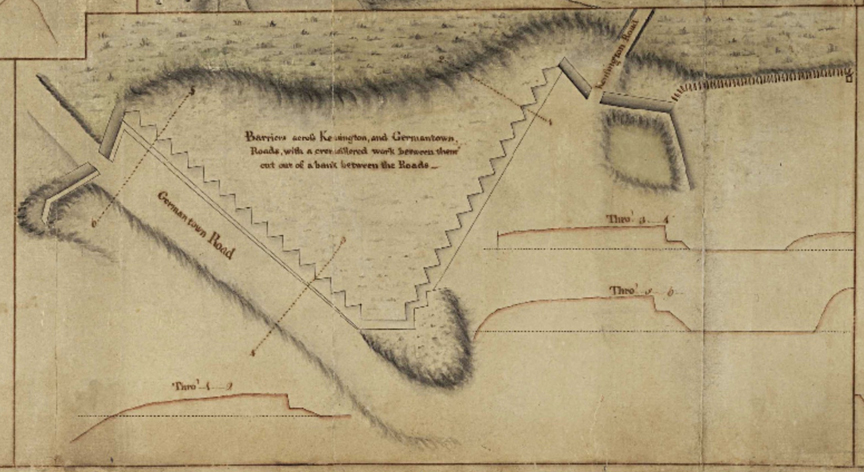
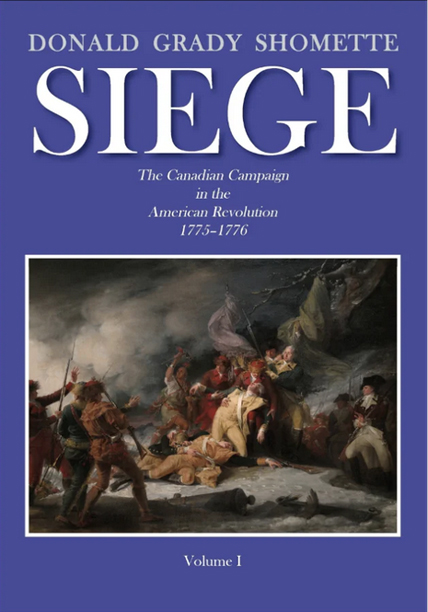


5 Comments
That’s the Christmas spirit, John! To continue with the theme, on Christmas day in 1778, some men of Whitcomb’s Rangers left Rutland, VT, to march to their next post in Haverhill, NH. Along the way, Moses Thompson had “his Feet Froze in such A Manner as Rendered him unable to Walk or do Any Business” (pension application). Samuel Smith suffered the same fate.
Excellent article. Re-enactor photos are super – they remind me of a Howard Pyle illustration of the Puritan Governor interrupting a Christmas celebration. Sad that the New England Puritans were no fun at Christmas. I’m sure Glover’s Regiment were likely an exception, but they had to take the army across the Delaware on Christmas Eve. The first known illustration of a Christmas Tree in Pennsylvania c. 1815 by John Lewis Krimmel, original illustration is at Winterthur.
Wonderful personal remembrances which must make us appreciate what they fought for and endured.
Thanks for this Christmas special. I follow you on Academia.edu and hope you’ll share more of those articles on JAR,
>From The Journal of Lieut. William Feltman of the First Penn.
Regiment, 1781-82.—
[South Carolina] 24th Dec’r ’81–The troops took up the line of march
at the usual time. This day very disagreeable marching, rainy and
very sloppy, and encamped withing two miles of Camden, in the woods.
16 miles.
25th Dec’r, ’81 — This day remained on the ground, the men being much
fatigued, their clothes very dirty. Received an invitation to dine
with Mr. Le Count. Seven other gentlemen besides myself. He has a
very fine plantation. His house is built on an Indian monument, about
ten feet high. We dined very sumptuously on a very elegant dinner,
and plenty of good spirits….This being one of the most remarkable
Christmases that every I experienced, very warm, &c, we passed the
afternoon very agreeably, without fire in the parlour.”